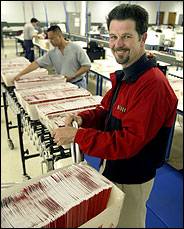
"This week, President Obama proposed imposing a $500,000 compensation cap on companies seeking a bailout. It’s a terrible idea. We all want the taxpayers’ money returned, and capping compensation at bailout recipients will just make it that much harder for those boards to hire and hold on to the executives who can lead their companies to compete and thrive. Perhaps a starting place for “tax, not shame” would be creating a top federal marginal tax rate of 50 percent on all income above $1 million per year. Some will tell you that would reduce the incentive to earn but I don’t see that as likely. Besides, half of a giant compensation package is still pretty huge, and most of our motivation is the sheer challenge of the job anyway. Instead of trying to shame companies and executives, the president should take advantage of our success by using our outsized earnings to pay for the needs of our nation." Businessman and Internet Visionary Reed Hastings of California, the founder of Netflix, served as a Peace Corps Volunteer in Swaziland.
Reed Hastings writes: Please Raise My Taxes
Please Raise My Taxes
By REED HASTINGS
Published: February 5, 2009
Los Gatos, Calif.
I’M the chief executive of a publicly traded company and, like my peers, I’m very highly paid. The difference between salaries like mine and those of average Americans creates a lot of tension, and I’d like to offer a suggestion. President Obama should celebrate our success, rather than trying to shame us or cap our pay. But he should also take half of our huge earnings in taxes, instead of the current one-third.
Then, the next time a chief executive earns an eye-popping amount of money, we can cheer that half of it is going to pay for our soldiers, schools and security. Higher taxes on huge pay days can finance opportunity for the next generation of Americans.
Clearly, the efforts over the past few decades to control executive compensation haven’t accomplished much. Improved public disclosure was supposed to shame companies into lowering salaries, and it obviously hasn’t worked. In 1993, President Bill Clinton changed the tax law to effectively cap executives’ salaries at $1 million a year, but that simply drove corporate boards to offer larger bonuses and stock options to attract and keep talent. More recently, “say on pay” proposals would have shareholders opine on their boards’ compensation decisions, but “say and pay” won’t change the fact that luring a top executive away from another company is never easy or cheap.
The reality is that the boards of public companies hate overpaying for anything, including executives. But picking the wrong chief executive is an enormous disaster, so boards are willing to pay an arm and a leg for already proven talent. Putting limits on the salaries at public companies, or trying to shame them into coming down, won’t stop this costly competition for talent.
Of course, it’s galling when a chief executive fails and is still handsomely rewarded. But with the concept of “tax, not shame,” a shocking $20 million severance package would generate $10 million for the government. That’s a far better solution than what we have today, not least because it works with the market rather than against it.
Another advantage is that it would also cover the sometimes huge earnings of hedge fund managers, star athletes, stunning movie stars, venture capitalists and the chief executives of private companies. Surely there is no reason to focus only on executives at publicly traded companies.
This week, President Obama proposed imposing a $500,000 compensation cap on companies seeking a bailout. It’s a terrible idea. We all want the taxpayers’ money returned, and capping compensation at bailout recipients will just make it that much harder for those boards to hire and hold on to the executives who can lead their companies to compete and thrive.
Perhaps a starting place for “tax, not shame” would be creating a top federal marginal tax rate of 50 percent on all income above $1 million per year. Some will tell you that would reduce the incentive to earn but I don’t see that as likely. Besides, half of a giant compensation package is still pretty huge, and most of our motivation is the sheer challenge of the job anyway.
Instead of trying to shame companies and executives, the president should take advantage of our success by using our outsized earnings to pay for the needs of our nation.
Reed Hastings is the chief executive of Netflix.













